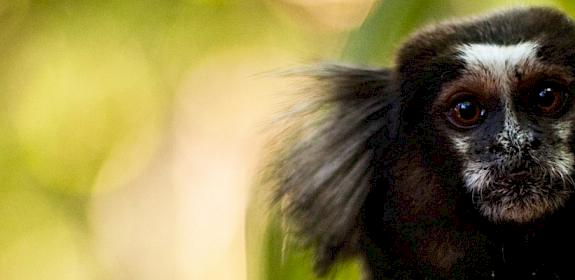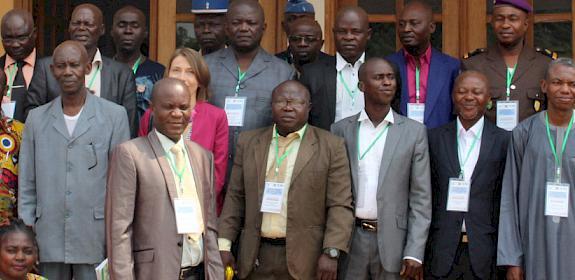Joining the dots: One Health approach critical to tackle challenges to human health, biodiversity loss and climate change
Principles from the One Health approach, as emphasised in the Convention on Biological Diversity (CBD) ‘draft Action Plan on Biodiversity and Health’, may offer practical solutions to tackle global health issues together with the unprecedented decline of biodiversity and the climate crisis, says TRAFFIC. Ahead of a high-level roundtable event on Climate Change and Pandemics at COP26 later today, TRAFFIC warns that the potential success of this approach is impossible without strong multi-sector collaboration.
“One Health emphasises how people, animals and the environment are interdependent on each other, and these same principles could be applied in tandem with climate change mitigation measures,” said James Compton, TRAFFIC’s Wildlife TRAPS Project Lead.
After the devastating fallout from the COVID-19 pandemic, government leaders and climate negotiators at COP26 are already more aware of linkages between public health, animal and wildlife health than ever before, but it is the health of the environment which needs equal attention to ensure ecosystem integrity is not further compromised by changes in climate.”
James Compton, TRAFFIC’s Wildlife TRAPS Project Lead
At the intersection of these crises, wildlife trade continues to be an essential source of income and sustenance for many communities at risk of losing their livelihoods, homes, and natural resource base due to climate change. Ensuring that legal wildlife trade is sustainable as well as safe from disease risk will support food security for communities that rely on wildlife, and help reduce the need for large-scale land-use changes.
As highlighted in an article co-authored by Dr Serge Eugene Mpouam, TRAFFIC’s Wildlife TRAPS Project Officer in Central Africa, the spread of infectious animal diseases is driven by many factors, including the movement of humans and animals across borders, contact between wild and domestic animals, and between humans and animals.
Globally, the number of domesticated animals far outweighs wild meat in terms of consumption by humans1, and domesticated meat sources harbour risk for zoonotic disease spread within large uniform populations of intensively-raised animals2. Mitigating disease risks from the interactions between humans, domesticated animals and wildlife has led to the prioritisation of zoonotic diseases in several countries in order to better target limited resources for maximum preventative impact.
The pandemic has emphasised the urgent need for countries across the world to unite to regulate, manage and monitor harvesting, trade and use of wildlife – more specifically the disease risks of zoonotic origin associated with some wild animal trade – to prevent illicit and high-risk activities while also ensuring that any legal trade is also safe and sustainable."
Dr Serge Eugene Mpouam, TRAFFIC’s Wildlife TRAPS Project Officer in Central Africa
2021 research on the impacts of removing wild meat from global food systems found that replacing wild meat protein with livestock would require approximately 124,000 square kilometres of extra agricultural land. Land-use change of this magnitude could drive large swathes of deforestation – a leading cause of climate change, force more than 260 species toward extinction and exacerbate the potential risks of emerging infectious diseases (EIDs) at the human-animal-environment interface3.
The Collaborative Partnership on Sustainable Wildlife Management’s (CPW) four guiding principles to reduce risk from zoonotic diseases notes that global bans on wildlife trade would fail to target these root causes of zoonotic disease emergence and harm the livelihoods and food security of millions of people who rely on wildlife.3. The CPW’s guiding principles underscore the need for context-specific responses that account for ecological, socio-political, economic and cultural factors to drive positive change.
“There is great scope for increased collaboration in science and policy to shape a post-COVID model that supports practical actions on One Health, biodiversity conservation and climate change mitigation and adaptation,” said Sabri Zain, TRAFFIC’s Director of Policy.
Notes:
Recent examples of TRAFFIC’s work to reduce risk of zoonotic disease transmission:
TRAFFIC explores how existing wildlife trade systems where disease risk mitigation, already factored into supply chain management, could be adapted to wider efforts to manage trade in wild animals.
On 03 Nov, One Health Day, Dr Mpouam presented TRAFFIC’s collaborative work to develop practical solutions to wildlife trade management and disease risk reduction through the USAID Wildlife TRAPS project to government officials, secretariats and IGOs/NGOs at the Célébrations de la Journée Mondiale ‘Une Seule Santé’ (world One Health day celebrations) event in Cameroon.
TRAFFIC's Wildlife TRAPS project is generously funded by the United States Agency for International Development (USAID).
Read more of the latest commentary, news items, projects, and TRAFFIC reports related to the pandemic in the TRAFFIC COVID-19 resource centre
References
- https://www.frontiersin.org/articles/10.3389/fpubh.2020.596944/full
- https://www.theguardian.com/environment/2020/may/26/ban-on-bushmeat-after-covid-19-but-what-if-alternative-is-factory-farming
- https://www.fao.org/3/a0789f/a0789f03.html
About Wildlife TRAPS
The Wildlife TRAPS Project, implemented by TRAFFIC and IUCN with funding support from USAID, is helping to forge cross-sectoral partnerships with government and experts in inter-governmental organisations, NGOs, academia, and the private sector to identify risk mitigation strategies to prevent future zoonotic spillover potential associated with trade in wild animals.
As well as social and behavioural change interventions, the Wildlife TRAPS project is supporting policy and regulatory reform efforts, including strengthening supply chain management systems. The identification of critical control points within wildlife trade supply chains will help target illicit and other high-risk wildlife trade practices that may facilitate the transmission of zoonotic diseases.
About USAID

The United States Agency for International Development (USAID) is responsible for the majority of overseas development assistance from the United States Government and works to end extreme poverty and promote resilient, democratic societies while advancing security and prosperity for America and the world. www.usaid.gov/





